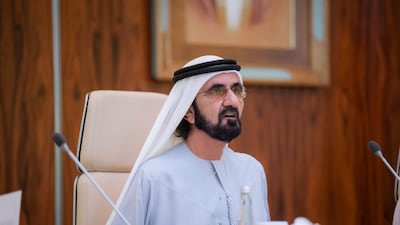Sheikh Mohammed bin Rashid, Vice President and Ruler of Dubai, said that the UAE, under the leadership of President Sheikh Mohamed, along with the outstanding efforts of the Emirati people, has become a global leader in various fields and achieved high ranks in international competitiveness indexes.
Sheikh Mohammed expressed his pride over the UAE entering the top 10 in the list of most competitive countries in the world.
The World Competitiveness Ranking 2023 is published by the World Competitiveness Centre of the International Institute for Management Development (IMD) in Lausanne, Switzerland.
The World Competitiveness Yearbook assesses the competitiveness of national economies in four main factors, 20 subfactors and 330 sub-indicators.
“The UAE has shown its excellence in various fields, such as international trade, city management, energy infrastructure, the adaptability of government policy to changes in the economy, lack of bureaucracy and other areas,” Sheikh Mohammed said.
“It is ranked fourth in the world for its remarkable economic performance.”
He also congratulated Sheikh Mohamed and thanked the thousands of teams who work hard day and night to ensure the country’s success.
Sheikh Mohammed commended the people of the UAE for their efforts, sincerity, dedication and support for the leadership, stressing they deserve to be among the best in the world.
“The future will be even better,” he added.
In this year’s IMD World Competitiveness Ranking, the UAE ranked first in the Middle East and North Africa for the seventh consecutive year and reached the tenth position worldwide, climbing two spots from last year.
Globally, Denmark ranked first, followed by Ireland and Switzerland.
How UAE life will change in 2023- in pictures
The UAE is a world leader in government efficiency, with the lowest personal tax rates, the most adaptable policies and the least bureaucracy.
It also has flexible residency laws, low tax evasion rates, and affordable capital and consumption taxes, ranking among the top five countries in these indicators.
The UAE achieved outstanding performances in the report’s main pillars, advancing in the economic performance category from sixth to fourth place.
In the business efficiency category, the UAE advanced to 16th place.
The UAE also ranked among the top 10 countries in eight sub-indicators, including first in global trade, second in infrastructure and fourth in local economy and tax policy.
The country also ranked sixth in employment and labour market, eighth in attitudes and values, and ninth in commercial legislation.
In the economic performance category, the UAE ranked first globally in the “Gross Fixed Capital Formation – Actual % Growth Index.”
It also ranked within the top five in indicators including employment rate and goods exports, and came second in tourism revenue, fourth in trade-to-gross domestic product ratio and fifth in unemployment rate.
The country excelled in the business efficiency categories, reaching the top five worldwide in indicators such as participation rate of the labour force and foreign labour force.
The UAE also ranked second in attitudes towards globalisation and availability of skilled foreign workers, third in international image of the country, and fourth in national culture and senior managers.
The UAE also topped the world in the infrastructure pillar in indicators such as low dependency ratio, inbound mobility of higher education students, city management, internet users, air transport quality and energy infrastructure.
The country also ranked fifth globally in the infrastructure indicator for the distribution of goods and services.





